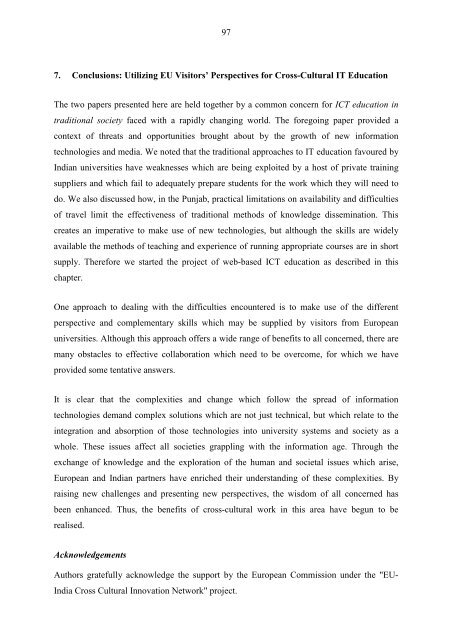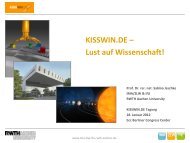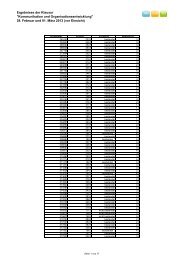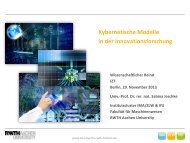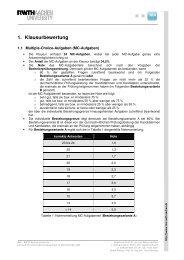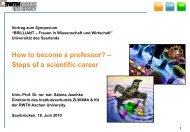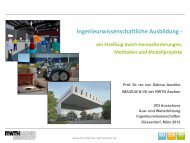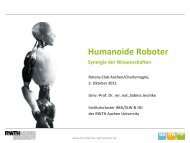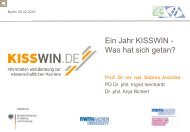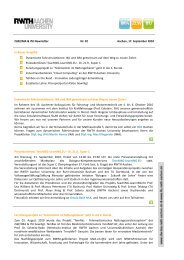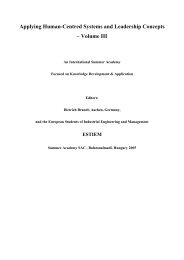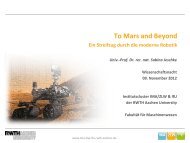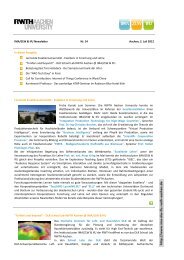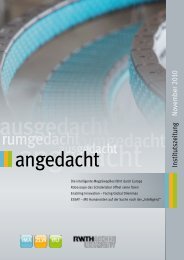Vol. II: Shaping Information and Communication ... - IMA,ZLW & IfU
Vol. II: Shaping Information and Communication ... - IMA,ZLW & IfU
Vol. II: Shaping Information and Communication ... - IMA,ZLW & IfU
You also want an ePaper? Increase the reach of your titles
YUMPU automatically turns print PDFs into web optimized ePapers that Google loves.
97<br />
7. Conclusions: Utilizing EU Visitors’ Perspectives for Cross-Cultural IT Education<br />
The two papers presented here are held together by a common concern for ICT education in<br />
traditional society faced with a rapidly changing world. The foregoing paper provided a<br />
context of threats <strong>and</strong> opportunities brought about by the growth of new information<br />
technologies <strong>and</strong> media. We noted that the traditional approaches to IT education favoured by<br />
Indian universities have weaknesses which are being exploited by a host of private training<br />
suppliers <strong>and</strong> which fail to adequately prepare students for the work which they will need to<br />
do. We also discussed how, in the Punjab, practical limitations on availability <strong>and</strong> difficulties<br />
of travel limit the effectiveness of traditional methods of knowledge dissemination. This<br />
creates an imperative to make use of new technologies, but although the skills are widely<br />
available the methods of teaching <strong>and</strong> experience of running appropriate courses are in short<br />
supply. Therefore we started the project of web-based ICT education as described in this<br />
chapter.<br />
One approach to dealing with the difficulties encountered is to make use of the different<br />
perspective <strong>and</strong> complementary skills which may be supplied by visitors from European<br />
universities. Although this approach offers a wide range of benefits to all concerned, there are<br />
many obstacles to effective collaboration which need to be overcome, for which we have<br />
provided some tentative answers.<br />
It is clear that the complexities <strong>and</strong> change which follow the spread of information<br />
technologies dem<strong>and</strong> complex solutions which are not just technical, but which relate to the<br />
integration <strong>and</strong> absorption of those technologies into university systems <strong>and</strong> society as a<br />
whole. These issues affect all societies grappling with the information age. Through the<br />
exchange of knowledge <strong>and</strong> the exploration of the human <strong>and</strong> societal issues which arise,<br />
European <strong>and</strong> Indian partners have enriched their underst<strong>and</strong>ing of these complexities. By<br />
raising new challenges <strong>and</strong> presenting new perspectives, the wisdom of all concerned has<br />
been enhanced. Thus, the benefits of cross-cultural work in this area have begun to be<br />
realised.<br />
Acknowledgements<br />
Authors gratefully acknowledge the support by the European Commission under the "EU-<br />
India Cross Cultural Innovation Network" project.


